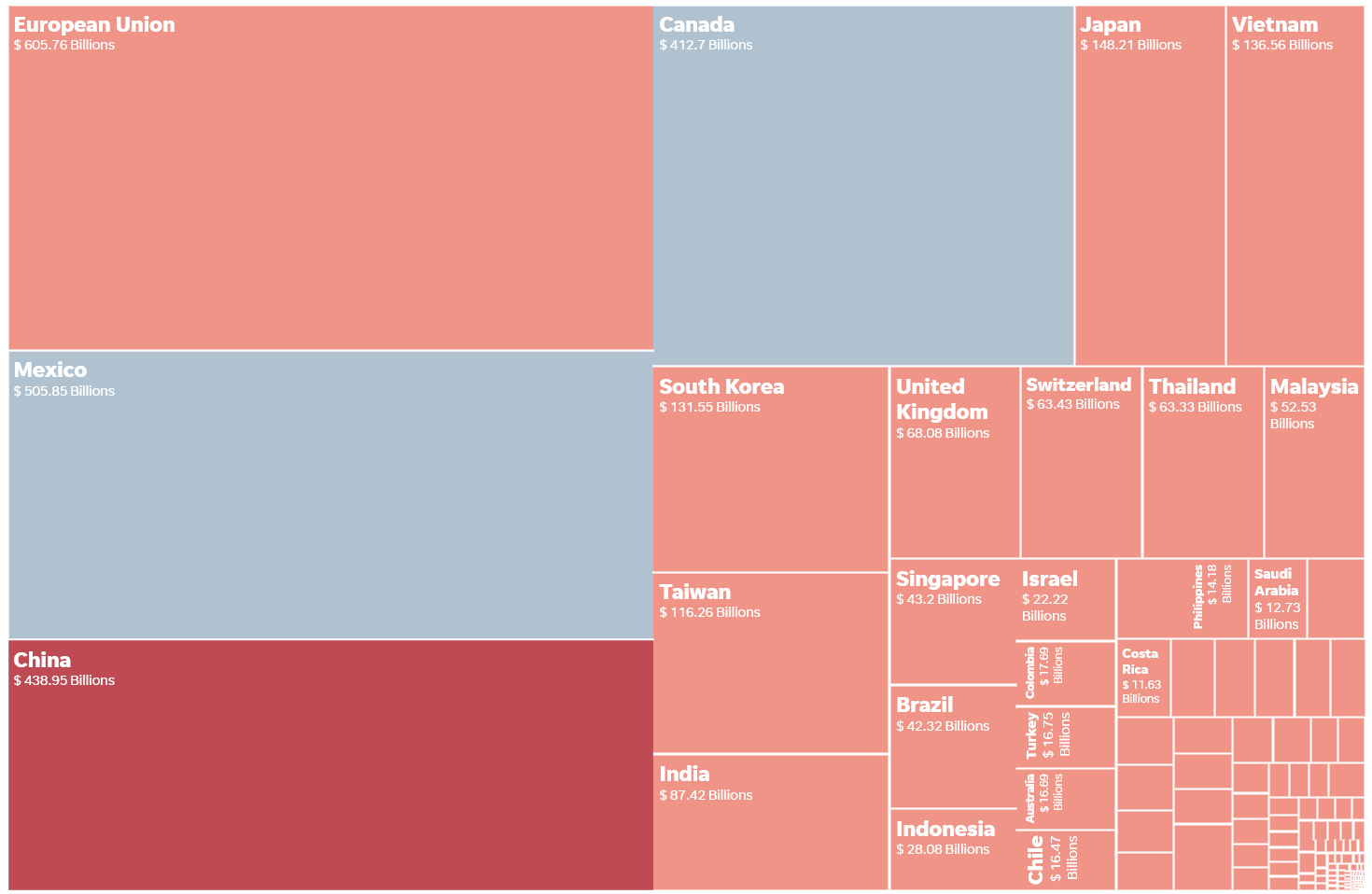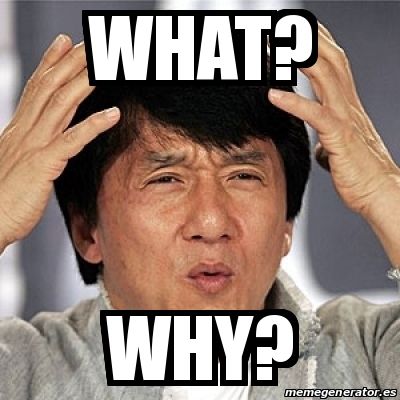"The Dumbest Trade War in History"
– The Wall Street JournalWhat's happening?
We're currently embroiled in what's being called "the dumbest trade war in history" -- that's a direct quote. When the Wall Street Journal (WSJ), a center-right newspaper written for business elites, feels compelled to write those very words to describe it the actions of a sitting president from a party that champions business and free trade, you best pay attention.
And that was written before tariffs were expanded globally to cover nearly every country. When tariffs only applied to Canada and Mexico.Here's a snapshot of where we are now:


What are Tariffs?
Tariffs are taxes or duties imposed by governments on imported goods. They are a form of trade barrier that increases the cost of imported products, typically used to protect domestic industries, raise revenue for the government, or influence international trade relationships. When a tariff is applied, it makes imported goods more expensive for consumers, which can encourage them to buy domestically produced alternatives.^ Straight from the AI overlord's mouth. Er, tokens?
What Happens Next?
No one really knows. No, seriously, no one actually knows. There are the immediate effects of higher prices for consumers and businesses, retaliations (counter-tariffs) from trading partners, and disruption to global supply chains. But the long-term consequences on international trade relationships, economic growth, and domestic industries are just a big 'ol question mark.
Those relationships are definitely damaged and there's no "backing out" of the harm we've done to our reputation around the world. This pain is going to be felt for at least a generation and it's unlikely the United States will ever be looked to for global leadership for at least three generations.
Why impose tariffs?
Tariffs are a "stick" you can use to protect your industries from foreign competitors and when used strategically (hint: now isn't strategic). The tariffs are paid as an import tax on the cargo at the time it crosses the border, which often gets carried over to the cost of the goods at time of purchase from stores. If your goal is to get industries to invest more locally, the proverbial "carrot" in this case are tax-breaks and grants or low-interest loans for businesses doing the things you want them to do.
However, blanket tariffs on everyone is just nonsense.
Why are blanket tariffs bad?
There's no rhyme or reason to them. It essentially taxes everything that we import, which is a lot. We've transitioned from a manufacturing economy to a consumerist economy. This means we don't make things, but we buy them from others (and we've become quite wealthy in the meantime!).
Digging in a bit more, we've become the wealthiest nation on the planet by focusing on services, technology, and intellectual property while letting other countries handle manufacturing of physical goods. Yes, we've lost those jobs and the expertise to build the manufacturing facilities, but if we're being honest -- neither you nor I would want to be a factory worker. And with record-low unemployment, you're not going to find many people willing to work in a factory for minimum wage. The reality here is that if, and that's a pretty big "if", manufacturing were to return, it'd make much more sense to automate it than to "deal with the pesky commoners", said some wealthy businessperson -- probably.
Why can't companies make stuff here?
It takes years and billions of dollars to build the factories to produce things locally. Companies would probably just rather wait out this presidential term and hope for a return to normalcy under the next president. Even if we assume the tariffs are permanent, companies cannot afford the labor in the US with the cost of goods as we've come to expect today. That means the minimum wage needs to go down (ouch!) or the factory work needs to be automated.
Why would anyone think this is a good idea?
Just about everyone doesn't. There are a whopping two people with any level of authority who think this is a good idea: the President (who's been obsessed with the idea since the '80s) and his trade advisor (who is a rogue economist and rejects just about the entire field's thinking). This is a half-baked idea predicated on the whims of two old men who don't really have a lot to lose. Meanwhile, you and I are going to be paying for a long, long, long time to come.
One theory floating around is that this is just a tax on people. This is a plausible theory because it's such a high investment to make things locally while these tariffs are in effect now. If the theory is true, this is really just a blanket sales tax across the country. Sales tax is currently only collected at the city and state levels, this could be a way to create a sales tax at the federal level as well. Perhaps the thinking here is to use sales tax to offset the massive tax cuts that were passed in 2017 that were set to expire soon but will now likely be made permanent.
Who supports tariffs?
It turns out, not many people. At a high level, in theory, partisan battle lines have been drawn in this, but in practice? No one wants to pay more for the same things that used to be cheaper, and especially not the people who normally vote for the man who started this.
As far as naming people relevant enough to have a public history you can look up, there are two people that support these tariffs: Donald J(ust-kidding) Trump and Peter Navarro.
Who is Peter Navarro?
He's got a whole, plentiful Wikipedia entry if you're inclined to go down that rabbit hole. Otherwise, he can be summarized as an economist who colors pretty far outside the lines. The more you read about his tariff obsession, the more you realize there are no lines in his world.
Who benefits from tariffs?
In general, no one. It gets pretty messy to untangle this, but it's a pretty safe bet that everyone is going to hurt as a result. Even "Made in USA" companies depend on trade. Some people will definitely hurt more than others. Apple, for example, was set to experience enormous financial pain (until it was given an exemption). The better question would be...
Who suffers from tariffs?
Enumerating this is impossible, it really will be everyone who will pay something. Think of raw materials like thread, iron, oil, and so much more. These materials need to be processed to produce workable material like fabric, steel, plastic/rubber. And then that material is used to create the products we use. Never mind trying to bring back the manufacturing, we don't even have a way to process the raw materials in this country much less the actual raw material. It's not like we can just go plant mango and coffee when we don't have any tropical landscape.
When do tariffs go into effect?
They're in effect now. If we rewind a bit, the first tariffs actually went into effect against China in 2018. Whereas those tariffs were targeted (just one country) and limited at (a still-steep) 25%, there was more reason to justify those tariffs even though the rate was a bit steep. It's why Biden kept most of those tariffs, because a rational case could be made that China was unfairly gaming our economy.
When do the tariffs end?
No one really knows, and likely not even Trump himself. We have learned recently that there is a threshold Trump isn't willing to cross and that's a Great Depression-level event. It's possible we may still get there, but the bond market going belly-up seems to have spooked him enough to pull back on the most severe of tariffs. At this point, we're just waiting to see when the man is willing to fold because he just doesn't have the cards he thinks he does.
When should I worry?
Now. You should be worried now.
How is this possible?
There's a lot here, but the short of it is that Congress (controlled by the same party that is afraid of Trump) had delegated control of imposing tariffs to the executive branch. This happened a long time ago, well before Trump. It's just, you know, no one actually expected the country would be run by an agent of chaos. The man is a chaos monkey in human form.
How can this be stopped?
Congress can take back the power of imposing tariffs. At the very least, it can narrow how tariffs can be implemented. This means, you guessed it, you need to reach out to your senators and representatives. It's daunting, I know. It's no fun, I know that too. But is your answer to why you didn't reach out to them to end this madness going to just be, "I didn't really feel like calling"?
How can I help?
There's a nifty app for that on iOS and Android. And even a website!